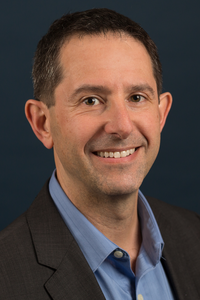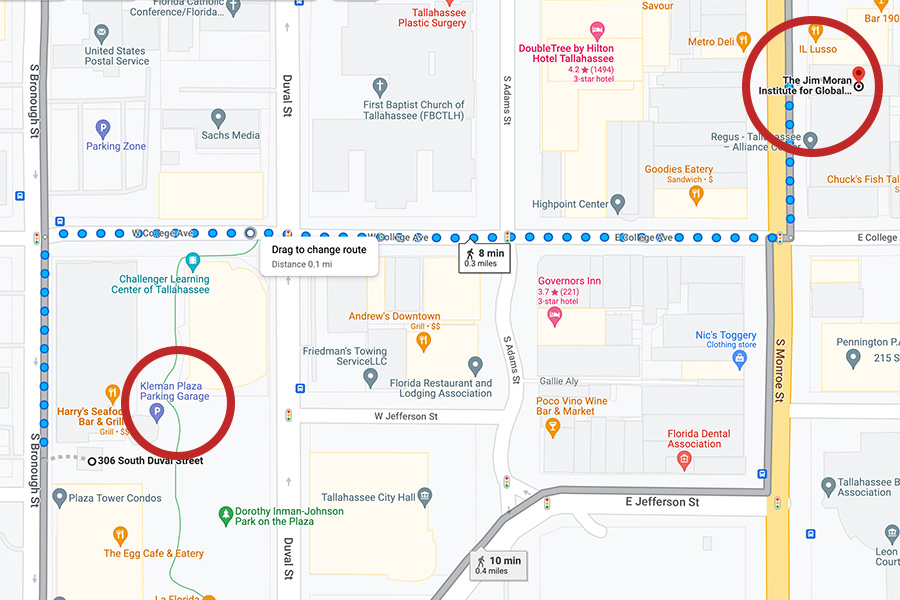MLx23: A machine learning Expo at FSU

About the Event
Florida State University will host the Machine Learning Expo on Saturday, April 22, 2023, featuring 15-minute presentations from FSU faculty, researchers, staff, and students on how they have incorporated machine learning technologies into their research, daily activities, and departmental or university operations from 9 a.m. to 5 p.m. at FSU’s Jim Moran Building in downtown Tallahassee. Each presentation will explore one succinct use case demonstrating the problem, its solution via ML, and an objective analysis comparing the subject before and after ML integration. This year’s expo will also feature keynote speaker Peter Stone, Ph.D., of the University of Texas at Austin’s Department of Computer Science Artificial Intelligence Laboratory, Texas Robotics and Sony AI America.
Keynote

Peter Stone is the founder and director of the Learning Agents Research Group (LARG) within the Artificial Intelligence Laboratory in the Department of Computer Science at the University of Texas at Austin, as well as associate department chair and Director of Texas Robotics. He was a cofounder of Cogitai, Inc., and is now executive director of Sony AI America.
Stone’s main research interest in AI is understanding how to best create complete intelligent agents. He considers adaptation, interaction, and embodiment to be essential capabilities of such agents. Thus, Stone’s research focuses mainly on machine learning, multiagent systems and robotics. To him, the most exciting research topics are those inspired by challenging real-world problems. He believes that complete successful research includes both precise, novel algorithms and fully implemented and rigorously evaluated applications. Stone’s application domains have included robot soccer, autonomous bidding agents, autonomous vehicles and human-interactive agents.
Presenters
Keith Roberson, Associate Professor
FSU Department of Art, FSU College of Fine Arts
Presentation: “Generative Art and its Impact”
Keith Roberson is an established figure in the world of digital arts, bringing over 25 years of experience and creative talent to his role as an associate professor at Florida State University. His captivating animated, virtual, interactive and kinetic sculptures have been displayed at prestigious galleries and exhibitions across the globe, including the Jepson Center for the Arts in Savannah, Georgia, the Royal Theatre of Manchester, United Kingdom, and the Venice Biennale, Italy. In addition to his artistic endeavors, Roberson is passionate about science education, having developed innovative exhibits like “Our Reefs: Caribbean Connections,” which has been showcased in over 25 cities throughout the Caribbean region, and interactive games like “Burning Issues” and “Silent Invaders,” distributed to over 10,000 classrooms around the U.S.
Zhe He, Associate Professor
FSU School of Information, FSU College of Communication and Information
Presentation: “Transparent Machine Learning”
Zhe He is an associate professor and chair of the Master of Science in Information Technology (MSIT) Program in the School of Information at the Florida State University. In iSchool, Zhe He directs the eHealth Lab. In addition, Zhe He is a core affiliate of FSU’s Institute for Successful Longevity and holds courtesy appointments with the Department of Behavioral Sciences and Social Medicine in the FSU College of Medicine and the Department of Computer Science, in the FSU College of Arts and Sciences. Zhe He is the team lead of the Biostatistics, Epidemiology, and Research Design (BERD)/Informatics Program of University of Florida-Florida State University Clinical and Translational Science Award. His research lies in biomedical and health informatics, clinical research informatics, data mining, knowledge representation, and big data analytics. The overarching goal of Zhe He’s research is to improve population health and advance biomedical research through the collection, analysis, and application of electronic health data from heterogeneous sources.
Yi Liu, Assistant Professor
FSU Department of Computer Science, FSU College of Arts and Sciences
Presentation: “A.I. for Science”
Yi Liu is broadly interested in machine learning, deep learning and data mining. Besides publishing top-tier papers, he is also active in open challenges and open-source communities. He is leading the champion team on Cleft Detection of Medical Image Computing and Computer Assisted Intervention (MICCAI) Circuit Reconstruction from Electron Microscopy Image (CREMI) Open Challenge, a member of the No. 3 team on the Open Catalyst Challenge, and a contributor to the popular open-source library DIG: Dive Into Graphs. Yi Liu’s current and specific research interests are graph neural networks and AI for science. He strives to develop novel graph AI methods and apply graph AI and AI techniques to solve important problems in sciences, including, but not limited to, quantum chemistry, material science, biochemistry and physics.
Shayok Chakraborty, Assistant Professor
FSU Department of Computer Science, FSU College of Arts and Sciences
Presentation: “Active Learning”
Shayok Chakraborty received his Ph.D. in computer science from Arizona State University in 2013 and has worked as a post-doctoral researcher at Intel Labs and Carnegie Mellon University. His research interests include machine learning, computer vision and assistive technology. He is the recipient of the National Science Foundation CAREER Award, Amazon Research Award, and the AWS Machine Learning Research Award for his research on weakly supervised machine learning.
Tom Juzek, Assistant Professor
FSU Department of Modern Languages and Linguistics, FSU College of Arts and Sciences
Presentation: “Using Information Theoretic Approaches to Detect AI-Generated Quiz Answers”
Tom Juzek (M.A., phonetics, University of Bonn, Germany; Ph.D., linguistics, University of Oxford, United Kingdom) is an assistant professor of computational linguistics. Juzek is interested in the application of computational methods to linguistic questions and, in particular, morpho-syntactic questions. His interests also extend to corpus linguistics and experimental syntax. Prior to joining FSU, Juzek worked in the tech industry for several years. His recent projects have been on English, German and Dutch.
Julia Smith, Research Faculty
National High Magnetic Field Laboratory
Presentation: "Machine Learning Applied to a Large NSF User Facility - A Vision To Strengthen Facility Impact"
Julia H. Smith is an instrumentation physicist and holds a research faculty position at the NHMFL’s DC Field Facility in Tallahassee. She also is the supervisor of the NHMFL’s Electronics Shop. Smith obtained her doctoral degree from Utrecht University, the Netherlands, in 2012, and she has worked at several large-scale user facilities both as staff and as a scientific user. Presently, Smith works on upgrade designs for the existing large-scale infrastructure and instrumentation of the DC Field User Magnet Facility. Her other tasks related to magnet operations include troubleshooting technical problems, the coordination of and participation in the infrastructure maintenance and the development of safety procedures and protocols related to the installation, operation and/or maintenance of the equipment. Smith’s research encompasses the development of machine learning algorithms to monitor scientific equipment and predict failures, as well as machine learning in the context of human performance and high reliability organizations. Smith has a passion for scientific outreach to the community and regularly hosts hands-on experimenting events for kids.
Olmo Zavala Romero, Assistant Professor
FSU Department of Scientific Computing, FSU College of Arts and Sciences
Presentation: “Machine Learning in Climate and Oceanography”
Olmo Zavala Romero’s current work focuses on machine learning algorithms to improve data assimilation in ocean models as well as for the prediction of subsurface fields from satellite data. Other areas of research include Geographic Information Systems on the web for the visualization of scientific data. He previously served as an assistant scientist at the Department of Radiation Oncology at the University of Miami, working on deep learning algorithms for the automatic detection of prostate cancer from multi-parametric MRI images and genomic data. Zavala Romero was previously an assistant professor at the National Autonomous University of Mexico, in the Center for Atmospheric Sciences, and earned his Ph.D. and M.S. degrees in computational science from FSU, an M.S. in computer science from the National Institute of Astrophysics Optics and Electronics, Mexico, and a B.S. in computer systems engineering from the Monterrey Institute of Technology and Higher Education, Mexico.
John Sobanjo, Professor
Department of Civil and Environmental Engineering, FAMU-FSU College of Engineering
Presentation: “Machine Learning Models for Prediction of Highway Pavement Performance Based on Construction Quality and In-Service Data”
John Sobanjo earned a Ph.D. in civil engineering from Texas A&M University in 1991, an M.S. in civil engineering from the University of Michigan in 1984, and a B.S. in civil engineering from the University of Lagos, Nigeria, in 1980. His research interests lie in the field of infrastructure engineering and management, specifically in materials, construction methods, and sustainability, as well as transportation engineering with a focus on advanced technologies such as GPS and Geographic Information Systems.
Gordon Erlebacher
Professor, FSU Department of Scientific Computing and Director, FSU Interdisciplinary Data Science Master's Degree Program, FSU College of Arts and Sciences
Presentation: “AI Tools for Academic Research”
Gordon Erlebacher received his education from the Free University of Brussels, Belgium, where he earned a B.Sc. and M.Sc., before going on to earn his Ph.D. from Columbia University in New York. His research interests lie in the modeling, analysis, and simulation of neuronal populations, single and multiple astrocytes, and other biological structures, both on serial and parallel architectures. He is also interested in researching neural networks with evolving topologies, as well as the application of gaming and gaming artificial intelligence to education, visualization, and feature extraction.
Panel Contributors: Ethics and Education
Rick Burnette
Associate Provost for Strategy and Analytics and Interim FSU CIO; Strategic Planning and Institutional Data Administrator, FSU Information Technology Services
Rick Burnette has been a leader of the data-informed student success effort at FSU for the past 20 years. He is credited with bringing CRM and enterprise business intelligence to the university in the early 2000s, with the latter earning him and FSU recognition as a finalist in the 2006 ComputerWorld Honors Program. More recently, Burnette spearheaded the Take 15 Initiative at FSU, implementation of the strategic plan, and the strategic management of metrics associated with statewide performance and preeminence funding that played a part in FSU's No. 18 Public University ranking in the 2020 U.S. News and World Report’s Best Colleges Rankings.
Randolph Langley, Senior Computer Scientist
FSU Department of Computer Science, FSU College of Arts and Sciences
Randolph Langley obtained his M.S. in computer science from FSU in 1996. He teaches courses such as ethics and computer science, binary formats and linkers, UNIX tools, and computer and network administration.
Shuyuan Ho, Associate Professor
FSU School of Information, FSU College of Communication and Information
Shuyuan Ho is a TrustedCI Fellow at the National Science Foundation Cybersecurity Center of Excellence. She received a Ph.D. in information science and technology from Syracuse University iSchool, New York, in 2009, an M.Phil. in information transfer from Syracuse University iSchool in 2007, an MBA in information systems from the University of Hartford, Connecticut, in 1996, and a B.S. in computer science from Ohio Dominican University in 1993. Shuyuan Ho’s research focuses on trusted human-computer interactions, specifically addressing issues of cyber insider threats and computer-mediated deception. The theory of trustworthiness attribution integrates social psychologies on trust and attribution, for insider threat detection as supported by cyberinfrastructure. Shuyuan Ho further develops the framework of collective sensing to assess human trustworthiness and disinformation in sophisticated online communication environments. Shuyuan Ho designs online games as an experiment protocol for investigating human deception and betrayal in virtual organizations. The sociotechnical research approach utilizes social-psychological theories along with pragmatic viewpoints on language-action cues to create an innovative methodology for computational modeling of next generation behavioral inference systems based on language-action features in complex trust relationships, human disposition and intent detection.
Agenda
Saturday, April 22, 2023, 9 a.m. to 5 p.m.
The Jim Moran Building
8:30 a.m. – Coffee and Registration
9 a.m. – Welcome Remarks
Sam Huckaba, Dean, FSU College of Arts and Sciences, and Stacey Patterson, FSU Vice President for Research
9:15 a.m. – Keynote Address
Peter Stone, Founder and Director, Learning Agents Research Group, University of Texas at Austin Department of Computer Science, with introduction by Gordon Erlebacher, FSU IDS Program Director
10:15 a.m. – Presentation: “Generative Art and Its Impact”
Keith Roberson, Associate Professor, FSU Department of Art
10:40 a.m. – Presentation: “Transparent Machine Learning.”
Zhe He, Associate Professor, FSU School of Information
11:05 a.m. – Coffee Break
11:25 a.m. – Presentation: “A.I. for Science.”
Yi Liu, Assistant Professor, FSU Department of Computer Science
11:50 a.m. – Presentation: “Active Learning”
Shayok Chakraborty, Assistant Professor, FSU Department of Computer Science
12:15 – 1:15 p.m. – Lunch Break/Poster Session 1
1:15 p.m. – Panel: Ethics and Education
2:15 p.m. – Presentation: “Using Information Theoretic Approaches to Detect AI-Generated Quiz Answers”
Tom Juzek, Assistant Professor, FSU Department of Modern Languages and Linguistics
2:40 p.m. – Presentation: “Concept Drift Detection and Time-Series”
Julia Smith, Research Faculty, National High Magnetic Field Laboratory
3:05 p.m. – Presentation: “Machine Learning in Climate and Oceanography”
Olmo Zavala Romero, Assistant Professor, FSU Department of Scientific Computing
3:30 p.m. – Presentation: “Machine Learning Models for Prediction of Highway Pavement Performance Based on Construction Quality and In-Service Data”
John Sobanjo, Professor, Department of Civil and Environmental Engineering, FAMU-FSU College of Engineering
3:55 p.m. – Presentation: “AI Tools for Academic Research”
Gordon Erlebacher, Professor, FSU Department of Scientific Computing and Director, FSU Interdisciplinary Data Science Master's Degree Program
4:30 p.m. – Poster Session 2
Directions
The event will take place in FSU's Jim Moran Building (downtown address). The presentations will be held in the Jim Moran Building Event Space. If no street parking is available, please use Kleman Plaza Parking Garage.


Sponsors
College of Arts and Sciences
College of Communication and Information
Department of Computer Science
Department of Mathematics
Department of Scientific Computing
Department of Statistics
Jim Moran College of Entrepreneurship
School of Information
